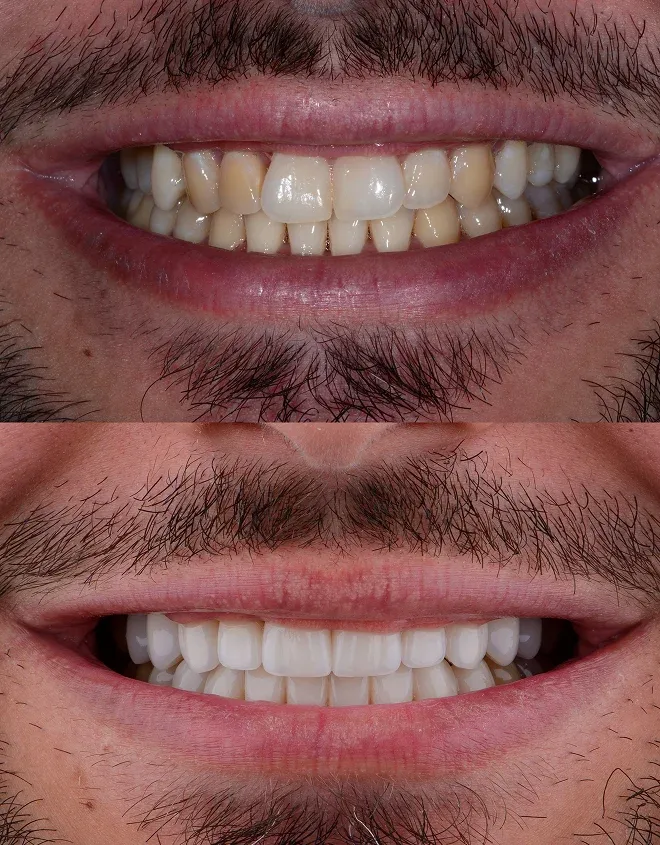General Dentistry
Do Veneers Ruin Your Natural Teeth? Myths vs. Facts

by Dr. Kang
09 May 2025

When people consider cosmetic dentistry, one of the most common questions is, "Do veneers ruin your teeth?" This concern often stops people from taking the next step toward improving their smile. Online, there are many conflicting claims, and it's hard to know what is true and what is not. This blog will break down the facts, clear up the myths, and explain exactly what happens to your natural teeth when you get veneers.

What Are Dental Veneers?
Dental veneers are thin covers placed on the front surface of teeth. Dentists use them to fix issues like gaps, chips, stains, or slightly crooked teeth. Veneers are usually made of porcelain or composite resin. They are bonded to the teeth using dental cement.
Many people believe veneers are a one-size-fits-all solution. But in reality, dentists design them based on your existing teeth, bite, and goals. Veneers are only placed after your teeth are fully assessed.
Veneers Ruin Your Teeth
This is one of the most common claims online. The phrase "do veneers ruin your teeth" shows up in search results often, but it is not true when veneers are done correctly by a licensed professional.
To place veneers, your dentist usually removes a small amount of enamel. This is to make space for the veneer so it does not look bulky. While this enamel removal is permanent, it does not mean the entire tooth is damaged. Your tooth is still healthy underneath and stays functional.
Fact: Veneers Require Tooth Preparation
Tooth preparation is necessary in most veneer procedures. This involves removing a thin layer of enamel. It is not the same as removing the full structure of the tooth. The enamel removed is usually about 0.5 mm, which is less than the thickness of a fingernail.
This step is key for getting a natural look. Without it, the veneer would sit on top and make the tooth appear too large. This is often what people misunderstand. They hear about “shaving” teeth and assume the whole tooth is reshaped. That is not the case with modern veneer procedures.
Do Veneers Damage Enamel?
Yes, enamel is removed. But damage implies that something harmful happens to your teeth. What actually happens is enamel reduction, not destruction. This step is controlled and minimal. Dentists use special tools to ensure that only the amount needed is taken off.

This is different from decay or trauma. The enamel that is removed is not causing harm. Instead, it allows the veneer to bond securely. Once the veneer is attached, it acts as a protective layer. In fact, veneers can shield the tooth from stains and minor wear.
Are Veneers Bad for Natural Teeth?
Another common belief is that veneers weaken natural teeth. People often search for “are veneers bad for natural teeth” because they assume adding a cover means the tooth underneath is at risk.
But if done right, veneers actually protect teeth. They seal off the front surface, reducing exposure to external elements. This is why many people with worn or chipped teeth choose veneers. The goal is not just to improve appearance, but to restore function and reduce further wear.
Problems only occur when veneers are done incorrectly. If a dentist removes too much enamel, or if bonding is not strong enough, the tooth may become sensitive or damaged. This is why the dentist’s skill and experience matter more than anything.
Porcelain Veneers Safety
Porcelain veneers are one of the most studied and tested options in cosmetic dentistry. They are biocompatible, meaning they do not react with the gum or cause harm to soft tissues. Their long-term record shows low failure rates and high success when placed properly.
Porcelain is also stain-resistant and strong. It does not discolor like natural enamel. This makes it useful for people who want a long-term solution for front teeth. Safety concerns usually come up when people use low-cost providers or get veneers abroad without proper follow-up.
Are Veneers Permanent?
This is another question that often causes confusion. Veneers are not reversible. Once enamel is removed, the tooth cannot return to its original state. That means you will always need some form of restoration on that tooth going forward.
But this does not mean veneers are short-term. Porcelain veneers often last 10 to 15 years. With care, they can last even longer. When they do wear out, they are usually replaced with new veneers, not a different kind of treatment.
Understanding the word "permanent" is important. It means you commit to having something on the tooth, not that the veneer will last forever without maintenance.
Veneers Have Side Effects
Some people say that veneers lead to pain, sensitivity, or gum problems. These issues can happen, but they are not common when the treatment is done properly.
Temporary sensitivity may occur in the days after enamel is removed. This usually goes away as your mouth adjusts. If sensitivity continues, it might be due to bonding issues or a poorly fitting veneer.
Gum irritation is also possible if the edge of the veneer is too close to the gum line. That’s why fit and contouring are important. A skilled dentist checks how the veneer sits with your gums before final bonding.
Teeth Shaving for Veneers: What Really Happens
The term "shaving teeth" sounds harsh. In most veneer treatments, it is not an aggressive process. Dentists use precision tools to remove a thin layer of enamel. This process is painless and usually done under local anesthesia.
The purpose of enamel reduction is to make room for the veneer. If no enamel is removed, the final tooth may stick out and not match your other teeth. This is especially important for front teeth where symmetry and bite affect your speech and chewing.
Minimal-prep or no-prep veneers are also available. These require little to no enamel removal, but they are not suitable for everyone. Your bite, tooth color, and shape all impact whether these are a good fit.
Pros and Cons of Veneers
Pros:
- Improve shape, color, and alignment
- Do not stain easily
- Custom-fit to each tooth
- Protect surface of the tooth
Cons:
- Enamel removal is permanent
- Not reversible
- May not work for people with very weak teeth
- Replacements needed in future
These pros and cons depend on individual dental history. This is why consultations are important. What works well for one person might not be right for another.
Cosmetic Dentistry Facts
Cosmetic dentistry is a clinical field. It is not just about looks. Every procedure has medical standards, safety checks, and long-term studies behind it. Veneers are not a shortcut to better-looking teeth. They are a treatment that involves planning, technique, and follow-up care.
One fact that often gets overlooked is the role of the bite. If your bite is not balanced, veneers can break or come off. Dentists often adjust the shape of veneers based on how your teeth meet when you talk or chew. This is part of the process that helps ensure long-term success.
Final Word
Veneers do not ruin your natural teeth when placed by an experienced professional. They do require enamel removal, which is permanent, but this does not mean your teeth are harmed. Veneers can strengthen and protect the front surface of teeth while improving appearance and function.
The decision to get veneers should be made after a full dental exam. Understanding the process and knowing the facts helps you make a choice based on real information, not online myths. If you're asking "do veneers ruin your teeth," the answer depends on who places them, how they are done, and whether they fit your dental needs. Work with a trusted provider and get all the facts before you commit.
Contact your Dentist today, Dr Kang at Redwood Dental Napa, to learn more about veneers.
Resource:
Share This:
Disclaimer
*This media/content or any other on this website does not prescribe, recommend, or prevent any treatment or procedure. Therefore, we highly recommend that you get the advice of a qualified dentist or other medical practitioners regarding your specific dental condition. *

